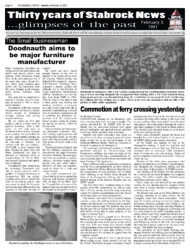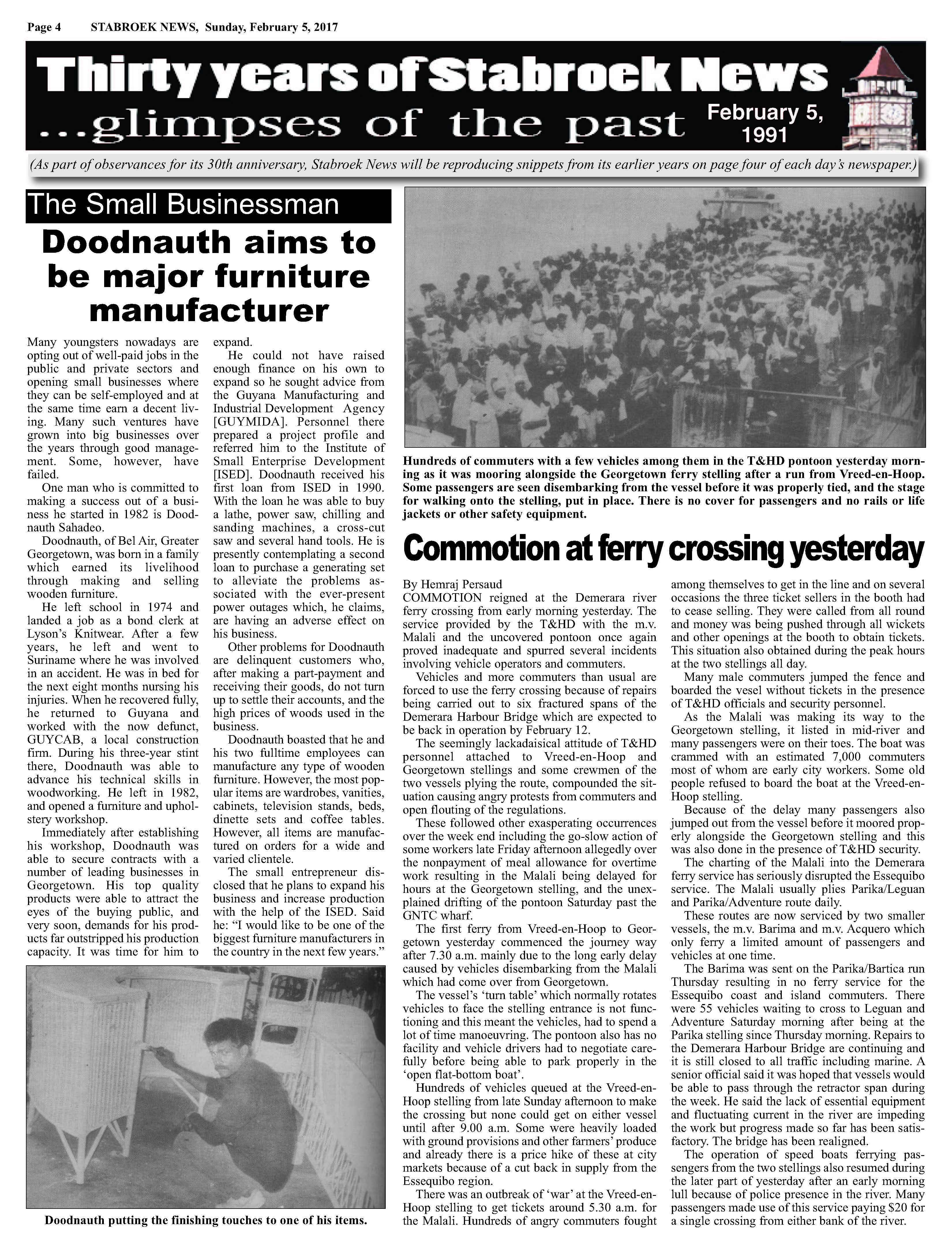Many youngsters nowadays are opting out of well paid jobs in the public and private sectors and opening small businesses where they can be self-employed and at the same time earn a decent living. Many such ventures have grown into big businesses over the years through good management. Some, however, have failed.
One man who is committed to making a success out of a business he started in 1982 is Doodnauth Sahadeo. Doodnauth, of Bel Air, Greater Georgetown, was born in a family which earned its livelihood through making and selling wooden furniture.
He left school in 1974 and landed a job as a bond clerk at Lyson’s Knitwear. After a few years, he left and went to Suriname where he was involved in an accident. He was in bed for the next eight months nursing his injuries. When he recovered fully, he returned to Guyana and worked with the now defunct, GUYCAB, a local construction firm. During his three-year stint there, Doodnauth was able to advance his technical skills in woodworking. He left in 1982, and opened a furniture and upholstery workshop.
Immediately after establishing his workshop, Doodnauth was able to secure contracts with a number of leading businesses in Georgetown. His top quality products were able to attract the eyes of the buying public, and very soon, demands for his products far outstripped his production capacity. It was time for him to expand.

Other problems for Doodnauth are delinquent customers who, after making a part-payment and receiving their goods, do not turn up to settle their accounts, and the high prices of woods used in the business.
Doodnauth boasted that he and his two fulltime employees can manufacture any type of wooden furniture. However, the most popular items are wardrobes, vanities, cabinets, television stands, beds, dinette sets and coffee tables. However, all items are manufactured on orders for a wide and varied clientele.
The small entrepreneur disclosed that he plans to expand his business and increase production with the help of the ISED. Said he: “I would like to be one of the biggest furniture manufacturers in the country in the next few years.”
Commotion at ferry crossing yesterday
By Hemraj Persaud
COMMOTION reigned at the Demerara river ferry crossing from early morning yesterday. The service provided by the T&HD with the m.v. Malali and the uncovered pontoon once again proved inadequate and spurred several incidents involving vehicle operators and commuters.
Vehicles and more commuters than usual are forced to use the ferry crossing because of repairs being carried out to six fractured spans of the Demerara Harbour Bridge which are expected to be back in operation by February 12.
The seemingly lackadaisical attitude of T&HD personnel attached to Vreed-en-Hoop and Georgetown stellings and some crewmen of the two vessels plying the route, compounded the situation causing angry protests from commuters and open flouting of the regulations.
These followed other exasperating occurrences over the week end including the go slow action of some workers late Friday afternoon allegedly over the nonpayment of meal allowance for overtime work resulting in the Malali being delayed for hours at the Georgetown stelling, and the unexplained drifting of the pontoon Saturday past the GNTC wharf.
The first ferry from Vreed-en-Hoop to Georgetown yesterday commenced the journey way after 7.30 a.m. mainly due to the long early delay caused by vehicles disembarking from the Malali which had come over from Georgetown.
The vessel’s ‘turn table’ which normally rotates vehicles to face the stelling entrance is not functioning and this meant the vehicles, had to spend a lot of time manoeuvring. The pontoon also has no facility and vehicle drivers had to negotiate carefully before being able to park properly in the ‘open flat-bottom boat’.
Hundreds of vehicles queued at the Vreed-en-Hoop stelling from late Sunday afternoon to make the crossing but none could get on either vessel until after 9.00 a.m. Some were heavily loaded with ground provisions and other farmers’ produce and already there is a price hike of these at city markets because of a cut back in supply from the Essequibo region.
There was an outbreak of ‘war’ at the Vreed-en-Hoop stelling to get tickets around 5.30 a.m. for the Malali. Hundreds of angry commuters fought among themselves to get in the line and on several occasions the three ticket sellers in the booth had to cease selling. They were called from all round and money was being pushed through all wickets and other openings at the booth to obtain tickets. This situation also obtained during the peak hours at the two stellings all day.
Many male commuters jumped the fence and boarded the vesel without tickets in the presence of T&HD officials and security personnel.
As the Malali was making its way to the Georgetown stelling, it listed in mid-river and many passengers were on their toes. The boat was crammed with an estimated 7,000 commuters most of whom are early city workers. Some old people refused to board the boat at the Vreed-en-Hoop stelling.
Because of the delay many passengers also jumped out from the vessel before it moored properly alongside the Georgetown stelling and this was also done in the presence of T&HD security.
The charting of the Malali into the Demerara ferry service has seriously disrupted the Essequibo service. The Malali usually plies Parika/Leguan and Parika/Adventure route daily.
These routes are now serviced by two smaller vessels, the m.v. Barima and m.v. Acquero which only ferry a limited amount of passengers and vehicles at one time.
The Barima was sent on the Parika/Bartica run Thursday resulting in no ferry service for the Essequibo coast and island commuters. There were 55 vehicles waiting to cross to Leguan and Adventure Saturday morning after being at the Parika stelling since Thursday morning. Repairs to the Demerara Harbour Bridge are continuing and it is still closed to all traffic including marine. A senior official said it was hoped that vessels would be able to pass through the retractor span during the week. He said the lack of essential equipment and fluctuating current in the river are impeding the work but progress made so far has been satisfactory. The bridge has been realigned.
The operation of speed boats ferrying passengers from the two stellings also resumed during the later part of yesterday after an early morning lull because of police presence in the river. Many passengers made use of this service paying $20 for a single crossing from either bank of the river.






